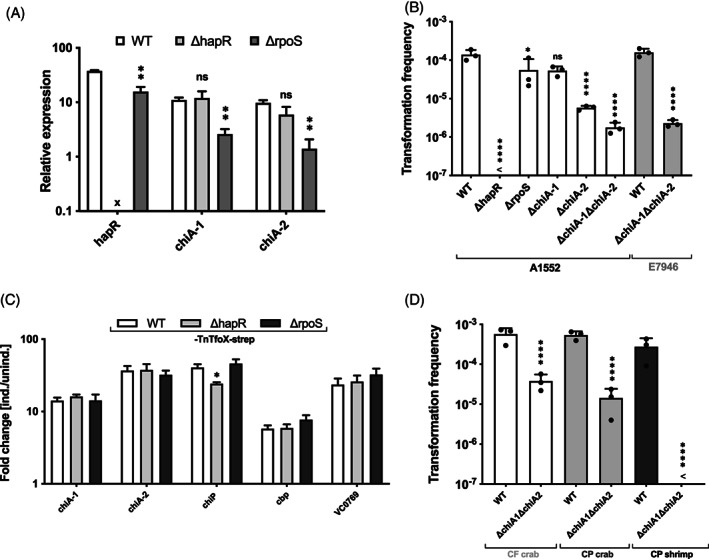Fig. 4.

RpoS and its regulated chitinases are conditionally dispensable for transformation.
A. RpoS influences chitinase transcript levels when grown on chitin. Relative expression levels of hapR, chiA‐1 and chiA‐2 for chitin‐grown WT, ∆hapR, or ∆rpoS V. cholerae strains. Details as in Fig. 2B.
B. Chitinases enhance natural transformation but are not essential. The indicated WT and knock‐out strains (in A1552 or E7946 background) were tested for their natural transformability on chitin flakes (as in Fig. 2A).
C. RpoS is dispensable after TfoX induction. Expression levels of representative chitin utilization genes were tested under TfoX‐non‐inducing and TfoX‐inducing conditions (see also Supporting Information Fig. S2) and the fold change upon TfoX induction is shown on the Y‐axis. (D) Commercially available chitin source support transformation in a chitinases‐dependent or ‐independent manner. WT and chitinase‐negative (∆chiA‐1∆chiA‐2) V. cholerae cells were scored for their natural transformability after their inoculation on different chitin sources: chitin flakes (CF) from crab shells, chitin powder (CP) from crab shells, and CP from shrimp. <, below detection limit. All data are based on three independent biological experiments and depict average values (±SD). Statistical analyses were performed to compare mutants to the WT using these tests: (A, C) multiple t tests corrected for multiple comparisons using the Holm‐Sidak method; (B, D) one‐way ANOVA with Sidak's multiple comparisons test. The detection limit was used for statistical analysis for conditions in which no transformants were recovered. *P < 0.05; **P < 0.01; ****P < 0.0001; ns, not significant. For panel C, only the statistically significant difference is shown. x, not applicable as hapR‐minus strain.
